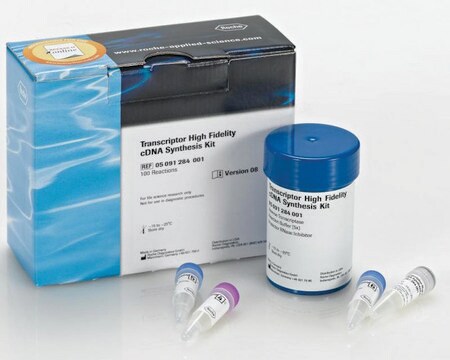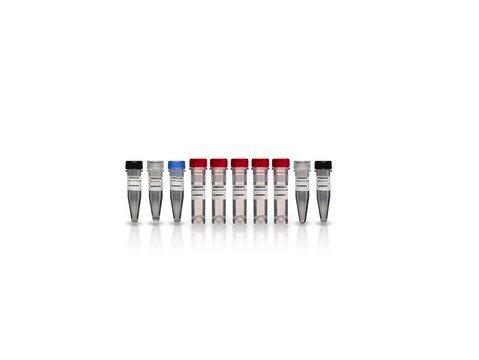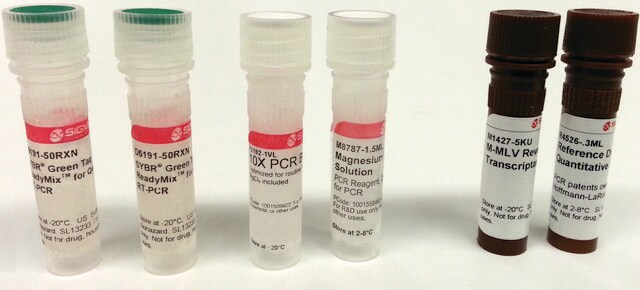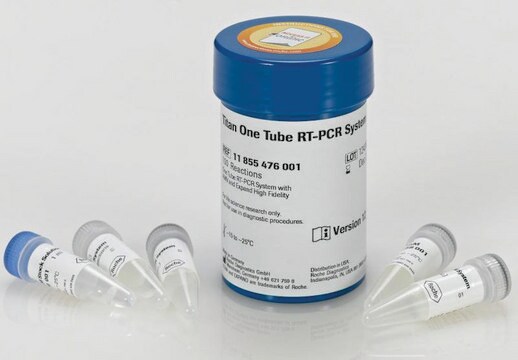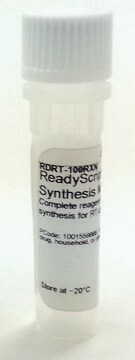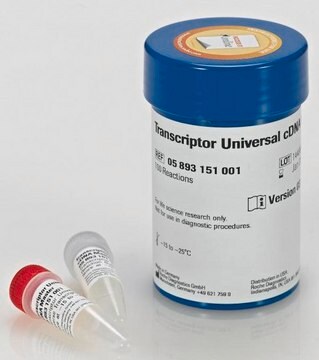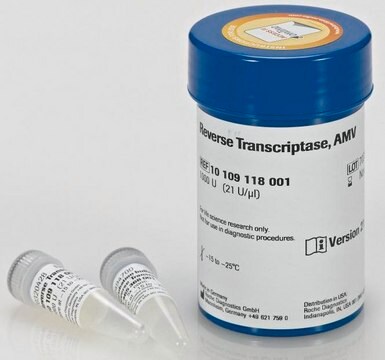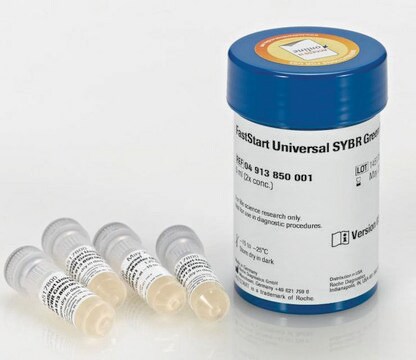11483188001
Roche
First Strand cDNA Synthesis Kit for RT-PCR (AMV)
sufficient for 30 reactions (including 5 control reactions), kit of 1 (10 components), suitable for RT-PCR, hotstart: no, dNTPs included
Synonyme(s) :
RT-PCR, cDNA sysnthesis
About This Item
Produits recommandés
Utilisation
sufficient for 30 reactions (including 5 control reactions)
Niveau de qualité
Activité spécifique
>50 units/μg protein
Caractéristiques
dNTPs included
hotstart: no
Conditionnement
kit of 1 (10 components)
Fabricant/nom de marque
Roche
Paramètres
42 °C optimum reaction temp.
Technique(s)
RT-PCR: suitable
Entrée
purified RNA
Température de stockage
−20°C
Description générale
AMV RT synthesizes the new cDNA strand at site(s) determined by the type of the primer used:
- at the 3′-end of the poly(A) mRNA when Oligo-p(dT)15is used as a primer,
- at nonspecific points along the mRNA template when using the random primer p(dN)6, or
- at a site determined by a sequence-specific primer.
Spécificité
Reverse Transcriptase AMV
Application
- Detection of the presence or absence of RNA viruses or other RNA-containing microorganisms (in combination with PCR)
- Quantification of mRNA for monitoring differential expression of a specific mRNA
- First step in the "differential display of mRNA"
- Generation of cDNA libraries with large and full-length inserts
- Reverse transcription-quantitative polymerase chain reaction (RT-qPCR) for reverse transcription of RNA into complementary DNA.
Caractéristiques et avantages
- Transcribes total RNA, mRNA and viral RNA along with difficult-to-transcribe secondary RNA structures
- Obtain cDNA transcripts up to 12 kb
- Higher thermostability (up to 50°C) and specificity than M-MuLV Reverse Transcriptase
- Purification of the resulting cDNA before PCR reaction is not necessary
It can be used with either sequence-specific primers, poly(dT)15 primers, or random primers, p(dN)6
Conditionnement
Qualité
Définition de l'unité
Autres remarques
Composants de kit seuls
- Reverse Transcriptase AMV
- PCR Nucleotide Mix, pH 8.5 10 mM each
- Reaction Buffer
- MgCl2 Stock Solution 25 mM
- Gelatin 0.05% (w/v)
- Oligo-p(dT)15 , 0.02 A260 units/μl 0.8 μg/μl
- Random Primer p(dN)6 , 0.04 A260 units/μl 1.6 μg/μl
- RNase Inhibitor 50 U/μl
- Control Neo pa RNA (1.0 kb in length with additional 19-base 3′-poly(A) tail) 0.2 μg/μl
- Water, PCR Grade
Code de la classe de stockage
12 - Non Combustible Liquids
Classe de danger pour l'eau (WGK)
WGK 1
Point d'éclair (°F)
does not flash
Point d'éclair (°C)
does not flash
Certificats d'analyse (COA)
Recherchez un Certificats d'analyse (COA) en saisissant le numéro de lot du produit. Les numéros de lot figurent sur l'étiquette du produit après les mots "Lot" ou "Batch".
Déjà en possession de ce produit ?
Retrouvez la documentation relative aux produits que vous avez récemment achetés dans la Bibliothèque de documents.
Les clients ont également consulté
Biosynthetic Genes lovE and lovF
Protocoles
First Strand cDNA Synthesis Kit for RT-PCR (AMV) Protocol
Notre équipe de scientifiques dispose d'une expérience dans tous les secteurs de la recherche, notamment en sciences de la vie, science des matériaux, synthèse chimique, chromatographie, analyse et dans de nombreux autres domaines..
Contacter notre Service technique
